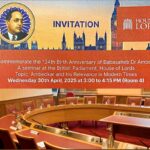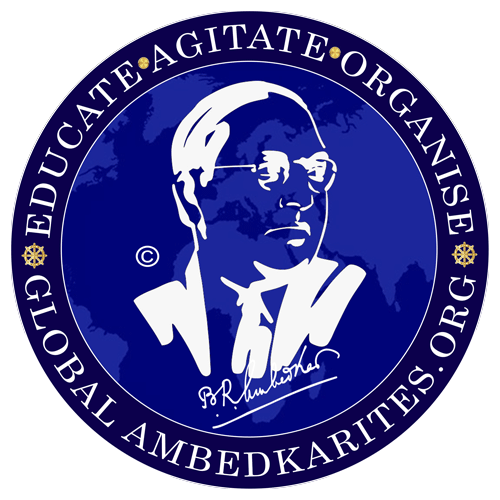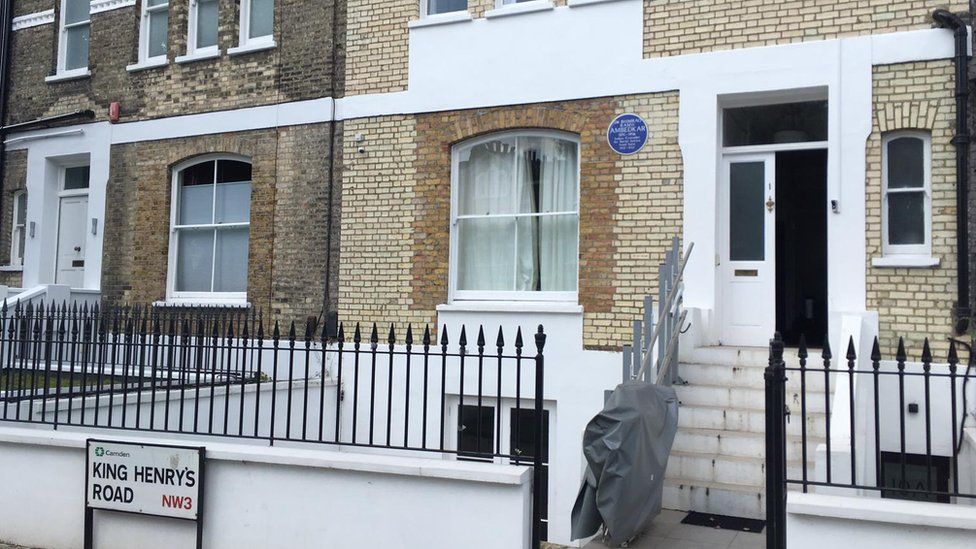
AMBEDKAR INTERNATIONAL MISSION (LONDON) ASKS FOR GOVERNMENT INTERVENTION IN THE AMBEDKAR HOUSE INQUIRY.
24th September was the opening of the hearing regarding an inquiry into alleged breach of planning rules by the management of Ambedkar House in London (AHL). I was at the inquiry on the first day of hearing and intending to be there on the next hearing date, 11th October too. I am reporting events, in the public interest, however I see them.
Since the purchase of Ambedkar House by the Government of Maharashtra, it has always been referred to as Ambedkar Memorial/Museum by its management team, although it did not have the official museum status. It had, and still has, residential status. This indicates that the government of Maharashtra was ill advised by the assigned advisors. After complaints by local residents, the council issued an enforcement notice. AHL management should have immediately stopped referring to it as Ambedkar Memorial, instead an appeal was made against an earlier refusal to grant it museum status.
At the hearing, Mr. Satpal Muman, as third witness and Secretary of Ambedkar International Mission London, gave written evidence requesting the council to grant the required permission for AHL to remain open to public and be granted museum status. This request was endorsed by multiple organisations and communities including the Sikh Federation and Sikh Missionary Society.
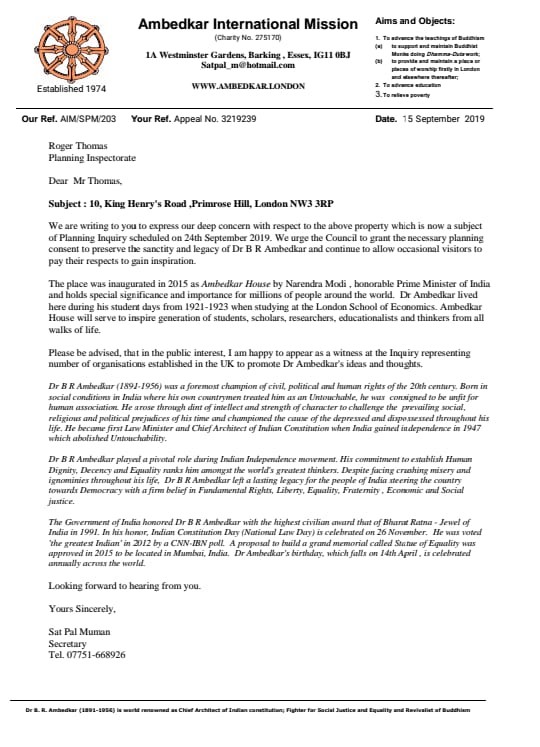
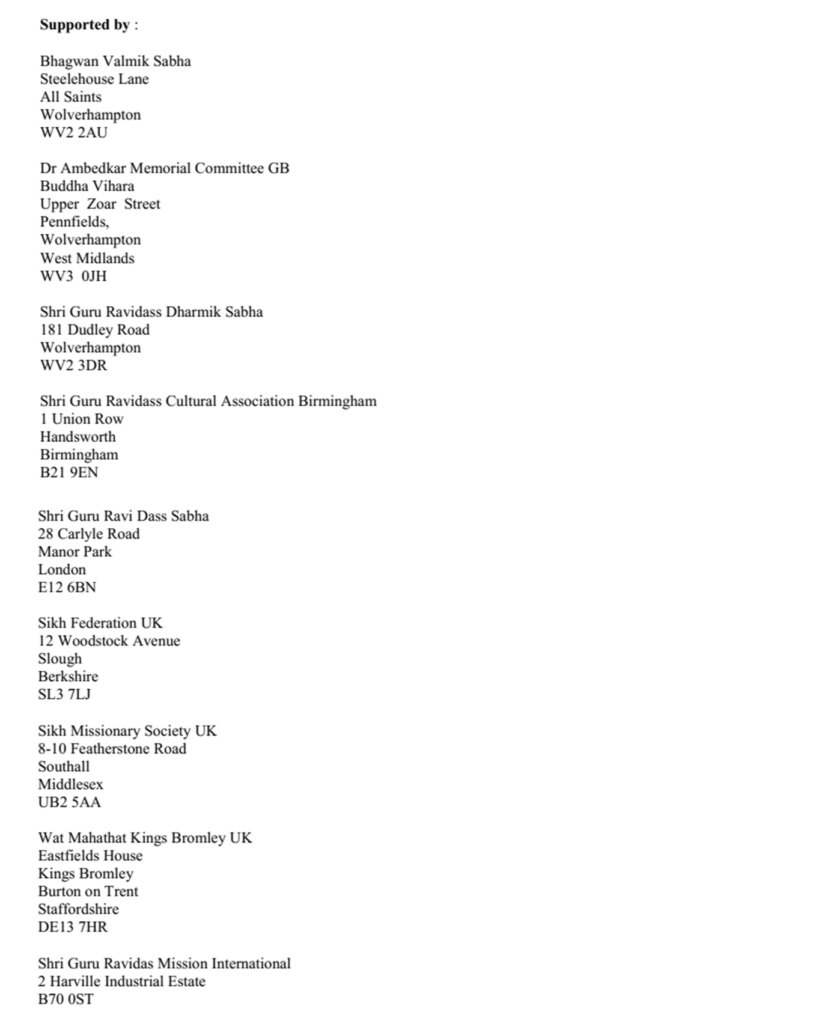
Separate (similar) letters were also sent to Robert Jenrick, the SECRETARY OF STATE FOR HOUSING and SECRETARY FOR COMMONWEALTH sometime back requesting intervention. The same letters were then copied to the High Commissioner of India.(Letter requesting Hon Robert Jenrick MP intervention)
There were several other supporting organisations too, but some were unable to send their endorsements on time. If required, they too could be mentioned on 11th October at the next hearing.
Mr. Muman, representing these communities and speaking in public interest, made some powerful points backed with historical facts about Dr Ambedkar’s contributions and relevance to the world at large, which I hope will significantly affect the direction of the inquiry in our favour.
At the end of the first day of enquiry, Dr William Gould, the academic witness, congratulated Mr. Muman and thanked him for highlighting and filling gaps when council witnesses were cross examined and said Ambedkar was only an economist and not a social revolutionary as depicted on blue Plaque.
At the inquiry, it was revealed that the Blue Plaque displayed in front of the building near the entrance did not have English heritage sanction. Nor is the place a listed building. Mr. Muman says, “Up until recently our enquiries found that Indian government officials informed us that no other organisation including FABO responded to Indian government official’s call for help. As there was no help forthcoming from anyone, we stepped in to help but it did not get us far as help sought was specific but we were never told by the High commission official that other ‘types’ of witnesses could also be put forward and kept impressing that a Lord, an MP an academic ONLY was required. We put forward a Lord, MP declined (as it was not just an appeal but an inquiry). We also forwarded the name of an academic from LSE which was suddenly blocked to my consternation.”
The inquiry will continue 11th October. The planning inspectorate will pass on his recommendation to the Secretary of state. This is a unique case regarding ‘decision to grant planning permission’ in UK history, such that the UK Secretary of State for Housing,
Communities and Local Government, Robert Jenrick will be the one making the final decision instead of the council planning office.
Before the inquiry and raising his voice on behalf of the public, Mr. Muman asked Mr. Jenrick for intervention via email. “Public interest will be taken in consideration”, says the cabinet minister.
Secretary of State for Housing, Communities and Local Government in the UK, @RobertJenrick has decided to intervene in the move to save Dr Ambedkar’s memorial in the Camden area of #London. India Today's @loveenatandon speaks to him to get more details. #ReporterDiary pic.twitter.com/8QGZMoF38N
— IndiaToday (@IndiaToday) September 25, 2019
Note that third party witnesses should not be dismissed out of hand as they bring crucial input and perspective to the main witnesses. That is the reason why such witnesses are invited to speak otherwise whole exercise is waste of time. British justice system should be commended for this. So I request concerned individuals and organisations to write letters individually to Mr. Jenrick as that will concentrate his mind more to give the correct decision otherwise reliance will be placed on bilateral relations to do the job.
Due to overwhelming requests, after the second sitting, I will try to update you with first hand account which will not affect the inquiry. Media reports can be misleading and sometimes, very conveniently, miss out on the really important bits
~Shekhar Bodhakar (AHL Forum)
End of Ambedkar House London (AHL) inquiry
End of Ambedkar House London (AHL) inquiry yesterday. Site visit arranged for 16th Oct. AHL forum played a useful part, causing some excitement with new crucial evidence of Dr Ambedkar’s connection to AHL, which the council barrister requested but the High commission witnesses, including the academic was unable to provide. The High commission Q.C. appreciated AIM London’s efforts in digging out useful info (including letters written by Babasaheb proving minimum length of his stay at AHL) that I had the privilege of submitting almost at the last minute.
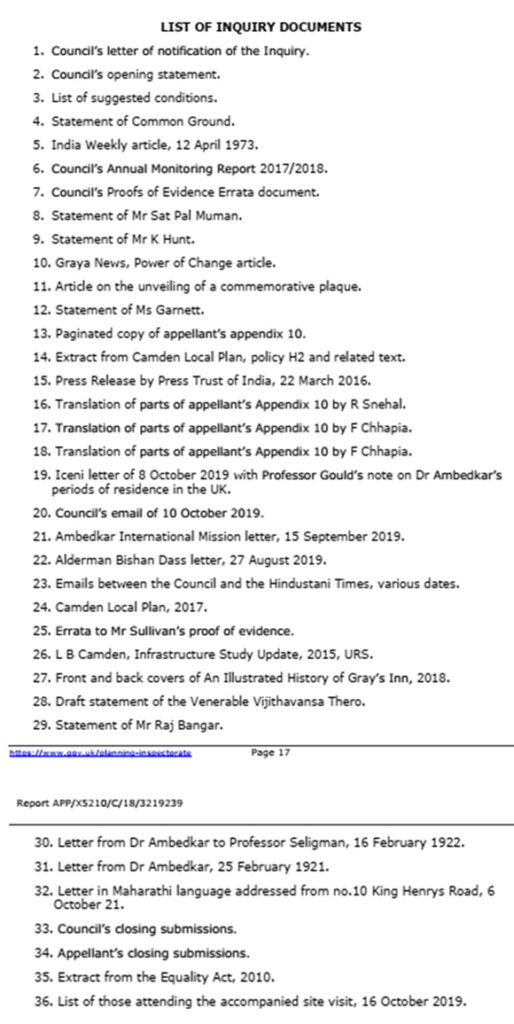
Media is surprisingly quiet after the big hype of possibility of AHL closure, except one small tweet by a witness.
“End of enquiry”
Just waiting for the decision by the Secretary of state. I am hopeful of a positive outcome.
Third Party witness in AHL inquiry
Regarding Ambedkar House being given museum status:
Decision by secretary of state:
Two points to note:
1. Camden council can still appeal against decision within 6 weeks but I doubt very much they would do that as they now look at Dr. Ambedkar with much more favorable eyes after they were bombarded with his achievements and importance.
2. The battle was as good as lost if Ambedkar International Mission (London) did not take the initiative to get the UK government involved in the decision making.
Third Party Witness:
Ambedkar House London Third Party witness played crucial role in this enquiry case that resulted converting Ambedkar House into Museum now.
Mr. Satpal Muman, secretary of AIM London managed to get the government involved (Refer item 21, AIM letter).
Shekhar Bodhakar, submitted evidence of Babasaheb’s longer connection with the house, than was previously assumed.
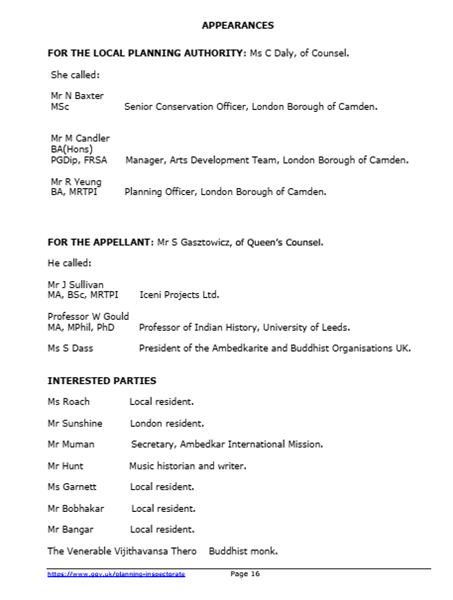
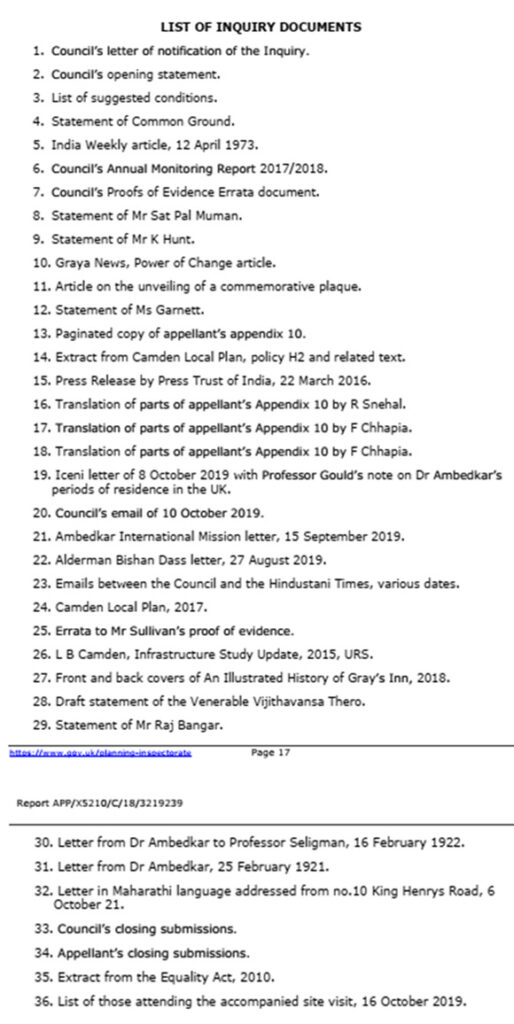
~Piyush Chauhan
Formal statement from Ambedkar International Mission on judgement given, by the secretary of state Minister Robert Jenrick
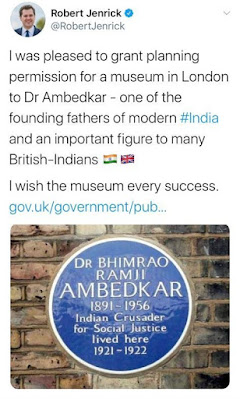
To whom it may concern
Subject: 10, King Henry’s Road, Primrose Hill, London NW3 3RP
I wish to extend my thanks to the secretary of State Mr Robert Jenrick Member of Parliament for his intervention to grant the change of use of 10 King Henry’s Road to a Museum.
Thanks also go to the Government of Maharashtra for following through the appeal to its logical conclusion and also thank many other interested parties involved in the appeal.
It is important to acknowledge that the announcement made by the Secretary of State on 12 March 2020 not only quashed the original Enforcement Notice but also granted the necessary planning permission for change of use to a Museum. We wish to thank him for doing the right thing in recognition of the great son of India Dr Ambedkar and for recognising the significance of 10 King Henry’s Road and the spiritual connection the place holds for people of all nations.
By way of a brief background, the issue of the enforcement notice came as a big surprise to me when in early September 2019 a delegation of Ambedkar International Mission London and Ambedkar House London Forum arranged a meeting with the Indian High Commission to formalise access to 10 King Henry’s Road.
One other item for discussion at that meeting was a proposal to publish the opening times of Ambedkar House on High Commission’s website for the benefit of the general public.
This meeting was chaired by Deputy High Commissioner Shri Charanjit Singh and a number of other delegates of the Indian High Commission. It came as a huge shock to discover at this meeting there was an Enforcement Notice issued by the London Borough of Camden to prevent the change of use to a Museum.
The Deputy High Commissioner agreed to our proposal regarding the publication of the opening times on High Commission’s website but he expressed his deep concern over the Enforcement Notice issued by the London Borough of Camden and the pending appeal against it.
He requested community support to help with the appeal and said that communities must do whatever they can to strengthen the appeal. In view of all deep anxieties felt and the significance of the place, we agreed to support the appeal. Subsequently, I was able to rally the community support and on 15th September 2019, formally wrote to Her Excellency the High Commissioner of India, Shrimati Ruchi Ghanashyam, offering our support.
On the same date, an appeal letter was also written to the Planning Inspectorate at Camden Council.
A letter was also written to the Secretary of State for Housing, Communities and Local Government The Rt Hon Robert Jenrick MP requesting his intervention
An appeal was also sent to Minister of State (Minister for the Commonwealth, the UN and South Asia) requesting his intervention.
When the day of hearing came, on 24th September 2019, as a third party witness, I was granted permission to speak and I also submitted a written statement to the Inspector hearing the appeal on behalf of a number of organisations calling for permission to be granted highlighting the importance and significance of Dr Ambedkar and his connection with 10 King Henry’s Road :
It is important here to mention a cross section of the various organisation who actively supported the appeal process, namely,
- Bhagwan Valmik Sabha Wolverhampton
- Dr Ambedkar Memorial Committee GB
- Shri Guru Ravidass Dharmik Sabha, Wolverhampton
- Shri Guru Ravidass Cultural Association, Birmingham
- Shri Guru Ravidass Sabha, London
- Sikh Federation UK
- Sikh Missionary Society UK
- Wat Mahathat, Thai Temple
- Shri Guru Ravidass Mission International
A number of other third party witnesses also spoke on both days of the appeal, including Mr Shekhar Bodhkar of Ambedkar House London Forum who spoke on the second day on 11 October with evidence connecting Dr Ambedkar with 10 King Henry’s Road.In my opinion, there was huge administrative failing from inception of the purchase of the building as I believe it should not have got into this terrible mess about planning consent so late in the day – considering the place was bought in 2015 ! But leaving all that aside, it’s a great day of joy and a cause for celebration for all concerned. It is hoped the place will now begin to function as a museum to promote Ambedkar’s thought and his legacy.
Yours Sincerely,
Sat Pal Muman, Secretary
Shekhar Bodhakar’s report after first day of Ambedkar House inquiry:
Mr. Bodhakar appealed to the UK’s Indian Diaspora to write individual letters to the Secretary of state and request him to grant the required permission.
It must be noted that Mr. Muman (AIM) and Shekhar Bodhakar (AHL Forum) were both present at the inquiry, representing communities and organizations who endorsed letters of support presented to the inspectorate on the first day of hearing and spoke in public interest.
UK minister steps in, saves Ambedkar House from closure
A museum dedicated to Bhimrao Ambedkar situated at the north London house where he lived from 1921 to 1922 whilst a student has been saved after the UK government approved an appeal by the Maharashtra state government against its closure.
Communities secretary Robert Jenrick allowed the appeal on Thursday. He tweeted: “I was pleased to grant planning permission for a museum in London to Dr. Ambedkar – one of the founding fathers of modern #India and an important figure to many British-Indians. I wish the museum every success.” By granting retrospective planning permission, the museum – bought by the Maharashtra state government in September 2015 at a cost of Rs 31 crore – will remain at its current site at 10 King Henry’s Road. It is the only museum dedicated to an Indian figure in London.
Jenrick, who is the secretary of state for housing, communities and local government, also quashed the enforcement notice ordering the museum’s closure issued by Camden Council on 16 November 2018 for breach of planning control after the Maharashtra government had converted two flats into a museum without the required planning permission.(Jenrick overturns enforcement notice preventing conversion of London homes into museum for Indian ‘national hero’)
Prime Minister Narendra Modi visited the house in 2015. It includes a gallery showing pictures of Dr. Ambedkar and related documents, a reading room where visitor can see and read Dr. Ambedkar’s literary works and a bedroom thought to have been used by Dr. Ambedkar. There is a statue of Dr. Ambedkar in the garden.
While allowing the appeal, Jenrick wrote that Dr. Ambedkar was “a major figure in Indian and British history” and the museum would provide cultural benefits and enhance tourism. This matched the recommendation by planning inspector K L Williams who wrote that the museum “is likely to be of particular interest to the substantial Indian diaspora in this country. It is also of wider interest in the context of Dr. Ambedkar’s role in India leaving the British Empire and becoming independent… There is likely to be scope for the museum to have educational value. A strong personal and spiritual link between No. 10 and Dr. Ambedkar is widely perceived.”
The majority of planning appeals in England are decided by inspectors, and it is rare for the communities secretary to step in, unless a development is large or controversial. But last year, Jenrick said he was recovering the appeal for determination by the central government “given the exceptional importance of Dr. Ambedkar in the story of the creation of modern India, and the lasting contribution of the British –Indian community on the shared cultural heritage of our country. Rather than taking the decision himself, Williams prepared a report and recommendation.
The report reveals that Camden Council argued that the Indian icon’s association with the house was “fleeting” and whilst living there, he was studying at the London School of Economics (LSE) “rather than being engaged in the human rights work for which he is famed”. The council said the exhibits at Ambedkar house are “limited in extent and quality” and do not tell the story of Dr.Ambedkar’s time there “coherently”.
“He was not of national importance in the UK”, the council added, suggesting LSE as a better location.
The appellant rebutted this saying that Dr. Ambedkar “lived at No.10 during a formative period in his studies and his thinking, a period which influenced his later social and political actions. Much of his studying would have been done at No.10. While at No.10 he was working on his thesis ‘The problem of Rupee’, which was later influential in the setting up of the Reserve Bank of India. The LSE would be inappropriate for a museum. He did not live there and no part of it had a personal link to him”.
Documents related to granting of museum status to Ambedkar House, London
Documents submitted by AIM, London:
List of documents submitted by AIM, London requesting intervention to urge Camden Council to grant the necessary planning consent to preserve the sanctity and legacy of Dr. B. R. Ambedkar
Letter requesting Hon Robert Jenrick MP intervention
Letter requesting Lord Ahmad of Wimbledon intervention
Letter requesting Her Excellency Ruchi Ghanashyam
Grant of Museum status to Ambedkar House, London:
Judgement:
Judgment regarding the Ambedkar House given museum status:
Formal Decision:
Formal decision granting museum status to Ambedkar House, London


